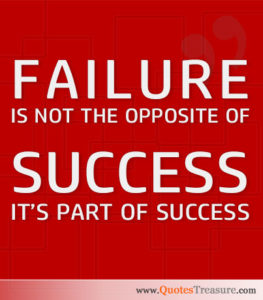Definition of Failure – “Failure is the state or condition of not meeting a desirable or intended objective, and may be viewed as the opposite of success.”
So much has been written about Failure and what it really means. To me as to many others it is about progressing to success. Almost all of the most successful people in life say the same thing. They have fallen so many times. They have failed over and over again, but they did not stop getting up and they never stopped trying.
There are hundreds of examples. Here are just 5:
Albert Einstein – His name is synonymous with genius, but he didn’t always show such promise. Einstein did not speak until he was four and did not read until he was seven, causing his teachers and parents to think he was mentally handicapped, slow and anti-social. Eventually, he was even expelled from school.
Micheal Jordan – He was cut from his high school basketball team, but luckily, didn’t let this setback stop him from playing the game. He stated, “I missed more than 9,000 shots in my career. I lost almost 300 games. On 26 occasions I was entrusted to take the game winning shot, and I missed. I have failed over and over and over again in my life. And that is why I succeed.”
Oprah Winfrey – One of the most iconic faces on TV as well as one of the richest and most successful women in the world, Oprah faced a hard road to get to that position, enduring a rough and abusive childhood as well as numerous career setbacks including being fired from her job as a television reporter because she was “unfit for tv.”
The Beatles – Few people can deny the lasting power of this super group, still popular with listeners around the world. Yet when they were just starting out, a recording company told them no. “We don’t like their sound, and guitar music is on the way out,”. The rest of the world couldn’t have disagreed more.
Vincent Van Gogh – During his lifetime, Van Gogh sold only one painting, and this was to a friend and only for a very small amount of money. While Van Gogh was never a success during his life, he plugged on with painting, sometimes starving to complete his over 800 known works. Today, they bring in hundreds of millions.
How failure affects the mind in positive ways
- Learning Lessons nurtures the brain physioloically, which encourates mental health.
- Builds Empathy by helping people learn how to better express empathy and compassion when others do not achieve their goals.
- Promotes Creativity becuase it forces the failed to reevaluate what they want and how to get it.
- Creates Humility because failure deflates the ego in people who might be in need of a bit of perspective.
- Encourages Flexibilty – One thing failure might teach involves how to approach problem-solving from a number of different angles as well as better navigating challenges as they present themselves
- Simplifies things by focusing on what is the most important
- Renews a person’s vigor and makes him/her work harder once the they reboot themselves from the failure.
Embrace Failure – it is how we learn and grow. Remember if Plan A didn’t work, the alphabet has 25 more letters! And numbers go to infinity!!
According to Napoleon Hill, there are at least 30 major reasons for failure.
- Unfavorable hereditary background
- Lack of well-defined purpose in life
- Lack of ambition to rise above mediocrity
- Insufficient education
- Lack of self discipline
- Ill health
- Unfavorable environmental influences during chlldhood
- Procrastination
- Lack of persistence
- Negative personality
- Lack of controlled sexual urge
- Uncontrolled desire for “something for nothing”
- Lack of well defined power of decision
- One or more of 6 basic fears
- Wrong selection of mate in marriage
- Over caution
- Wrong selection of associates in business
- Superstition and prejudice
- Wrong selection of vocation
- Lack of concentration of effort
- The habit of indiscriminate spending
- Lack of enthusiasm
- Intolerance
- Intemperance
- Inability to cooperate with others
- Possession of power that was not acquired by self effort
- Intentional dishonesty
- Egotism and vanity
- Guessing instead of thinking
- Lack of capital
You can read more about them here.
Failure and what is said about it from a religious perspective
- The Jewish Talmud wisely enjoins us to remember that “If one says to you: I have struggled mightily and I have not prevailed, do not believe him” (Megillah 6b).
- As King Solomon said, “A righteous person falls seven times and gets up” (Proverbs, 24:16).
- Abraham in the Torah, was tested with 10 trials. As Torah commentators point out, the Hebrew word for test, nisayon, is related to the same root as the word for raised or elevated: the ability to overcome obstacles, survive failures and learn and grow from them is what elevates us spiritually and permits us to rise to ever greater heights as human beings.
- “Every descent is for the sake of a future ascent” (Hasidic Jewish wisdom). Never perceive a failure (descent) as an isolated event. It’s part of a learning curve. Broaden your lens a little and you will see this temporary setback as a tiny cog in a huge engine of overall progress.
- Rav Moshe of Kobrin told his followers that when they fail at achieving their goals or make mistakes, they should not be discouraged. Rather they should focus on correcting themselves in the future; trying again and again, until they are successful. To illustrate his point, he asked a disciple whom he knew to have grown up in a farm, “Did you ride on a horse?”“Of course. All the time.”“Did it ever happen that you fell off the horse?”. “Many times,” he replied.“And what did you do when you fell off?”“I just mounted the horse again, and continued riding. I focused on staying on securely” the disciple answered. ” This is the model how we should react to our failures and mistakes. Never give up. Regardless of how many times you fall, keep on trying.”
Anticipate Failure, learn from it, and move on
No failure should ever stop anyone from trying again until success is achieved. In other words, only by giving up does one fail. As long as you continue, you only experience temporary set-backs. Failure leads to victory but only for those who persevere through them all. We cannot hope to never fail; that is impossible. What we can do is to continue to rise every time we fall, which will guarantee us success. Failure is part of the path that leads to eventual success. The greatest failure of all is to fail and never try again. When that happens, failure is final, but God never intends for us to fall and not get back up again. If that were so, no toddler would ever learn to walk.
More Resouces about failure and success
- Watch the video and learn from this dog about failure and success!!
- The Blessing of Failure
- Failure Quotes
- Tony Robbins and Fear of Failure
Sara Metzger’s Helping Your Succeed Blog
Skype: Sara.Metzger
Email: sarametzger@comcast.net
Facebook Fan Page: https://www.facebook.com/sara26.metzger?fref=ts
P.S. Need help in succeeding in life, in business, in relationships? Contact me today!



Shalom Sara Metzger. So many great points to ponder and work upon. Especially the Jewish views. May the efforts you put in be blessed. Thank you Ma,’am.